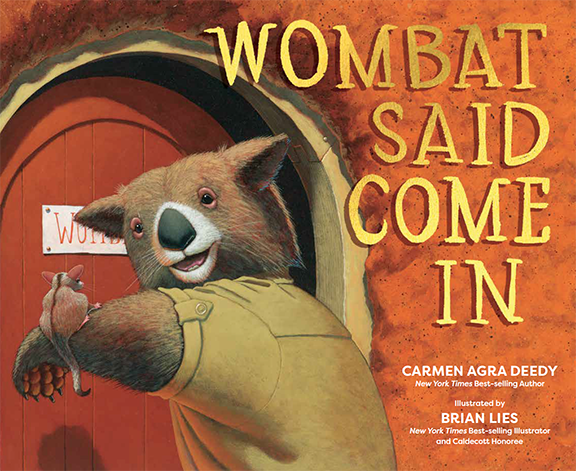WOMBAT SAID COME IN
By Carmen Agra Deedy, illustrated by Brian Lies
Peachtree/Quinlin, $18.99 (36p)
ISBN 978-1-6826-3321-2
While wildfire is raging above, Wombat stays safe in his cozy burrow. What might he do when trouble — in the form of an unexpected guest— comes knocking at his door? After an instant’s hesitation, he opens the door and says “Come in, my friend, come in!“
Soon others come a-knocking. One by one, five uniquely Australian animals — Wallaby, Kookaburra, Platypus, Koala, and Sugar Glider — appear. Wombat welcomes them all, with growing anxiety.
Before long, Wombat’s peaceful burrow becomes a pandemonium of messy and unruly guests who take his favorite chair and wear his slippers. What, oh what, is a bighearted Wombat to do?
But trouble doesn’t last forever, and once the fire passes, wombat is relieved to finally find himself alone.
Or is he?
Reviews for Wombat Said Come In
KIRKUS (STARRED REVIEW)
Review Issue Date: August 1, 2022
Wombat’s sense of hospitality is hard-pressed as other animal residents of the burning Australian bush seek refuge in his cool, safe, underground home.
From the start, the text seems made for a read-aloud: “Wombat was not worried. No, not a tittle. Fire had passed over his burrow before.” A delightful, full-bleed double-page spread depicts a cutaway of Wombat in his orange-toned burrow, while outside and above, readers see a pale sky and a drift of smoke. The mannerly marsupial—his patterned quilt wrapped over his collared, khaki shirt—settles in to have tea and wait out the fire. Immediately, he hears the first of many interruptions at his door. Wallaby is begging for shelter, and Wombat invites him in with a welcoming verse that becomes his standard reply each time another refugee arrives (“Wombat said, ‘Come in!’ / Wombat said, ‘Come in!’ / From smoke and din / and howling wind / come in, my friend, come in!”). The charming, easily learned mantra changes only when the crisis ends. Each succeeding guest is more demanding, from Kookaburra, Platypus, and Koala to tiny Sugar Glider. The dry wit of the text is matched by art that is both detailed in illustrating each animal and hilarious in showing poor Wombat’s trials. One of many funny touches is the fact that only Wombat wears clothing. Beneath the fun, however, lies the grim reality of climate change, tempered by lessons in zoology and, especially, practical altruism. (This book was reviewed digitally.)
A superb read-aloud balancing messages about the environment and generosity with humor and heart. (Picture book. 4-8)
Kirkus Also Calls Wombat Said Come In “One of 16 Picture Books Sure to Delight this Fall” Read the article HERE
HORN BOOK
September / October 2022
As fire spreads above his burrow, a wombat opens his underground home to a series of Australian animals, including a wallaby, kookaburra, and platypus. Each visitor makes itself comfortable immediately and, with Wombat’s care and attention, gets what it needs. “Kookaburra commandeered wombats favorite chair“; “platypus padded away in Wombat’s favorite slippers.” Wombat’s life is transformed for several days, and his once-peaceful home is especially disrupted by the antics of Sugar Glider. When the danger has passed and most of the animals head back to their dwellings, Wombat generously invites Sugar Glider, who has no home to go back to, to stay. Deedy’s (Rita & Ralph’s Rotten Day, rev. 5/20) effective use of repetition in structure and language (“Wombat said, ‘Come in!’ / Wombat said, ‘Come in! / From smoke and wind and howling din’ ”) reads like an Australian cousin to Brett’s The Mitten. Lies’s richly colored illustrations, featuring expressive anthropomorphized animals, display both the comfort and chaos of Wombat’s home. He changes perspective from page to page so viewers are sometimes up close, sometimes peering down from above. The shifts successfully create the sense of disarray in Wombat’s space. Educators will find multiple curricular connections for this tail of hospitality, climate, and displacement, but young readers will likely be most attracted to the humor in text and art and the personalities of the animal neighbors. —Maeve Visser Knoth
PUBLISHERS WEEKLY
Carmen Agra Deedy, illus. by Brian Lies. Peachtree/Quinlin, $18.99 (36p) ISBN 978-1-6826-3321-2
Fire is raging outside his burrow, but Wombat “was not worried.” Acrylic and colored pencil renderings by Lies (the Little Bat series) of Wombat’s multilevel burrow, which include an elaborate cutaway, instantly establish it a place of safety and comfort. Wombat generously offers this home to five frightened animals who appear at his door in turn, each greeted by Agra Deedy’s (Rita and Ralph’s Rotten Day) refrain: “Wombat said, ‘Come in!’/ Wombat said, ‘Come in!/ From smoke and din/ and howling wind,/ come in, my friend, come in!’ ” Wallaby immediately commandeers Wombat’s beloved quilt, Kookaburra snags the host’s favorite chair, and the house is in short order a mess. The danger finally passes, and stretched-to-the-limit Wombat (the only clothes-wearing animal), announces that his guests must “Skedaddle! Shoo! Go home!” But when pocket-size Sugar Glider reveals having nowhere to go—a moment of pause in the otherwise rollicking telling—Wombat changes the critter’s status to full-time roommate. With unspoken but unmistakable reference to the ravages of climate change, the creators underscore the idea that hospitality is not always about politesse—it can be a matter of life and death. Ages 4–8. Author’s agent: Brenda Bowen, Book Group. Illustrator’s agent: Erin Murphy, Erin Murphy Literary. (Oct.)
When friends come knocking in the middle of a wildfire, what’s a hospitable wombat to do?


